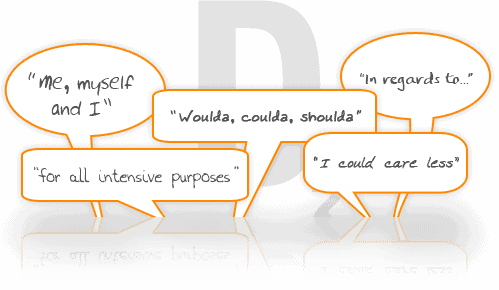Where do little verbal blunders come from? Maybe you heard someone say something incorrectly when you were a kid, picked it up and couldn’t break the habit. Maybe you’re just not paying attention. We’ve already tackled some of the business world’s favorite grammar gaffes and why they matter in your business writing and social media, but here are some words and phrases many people get wrong when they’re speaking (and writing, too).
Me, myself and I
People love to use “I” and “myself” because they think it makes them sound a little more polished, as in, “Can you get those papers to Joe and I by the end of the day?” or “They sent the email to Jane and myself.” I’m not going to get into the nitty-gritty of pronoun agreement (you’re welcome), but here’s a good rule of thumb: any time that you would say “me” or “I” when you are talking about just yourself, you also say it when Joe’s coming along for the ride. So it’s “Joe and I are going out to lunch”—because you wouldn’t say “Me am going out to lunch” and it’s “Please get those papers to Joe and me,” because you would never say “Please get those papers to I.” And in 90% of cases, just skip the “myself.” It’s grammatically incorrect and sounds clunky, not smart.
“I could care less”
Think about it for a second. If you could care less, that means you do care, at least a little bit—which is probably not what you’re trying to convey.
Woulda, coulda, shoulda
It’s always would have. Would of, could of, etc. are incorrect. So instead of saying “I would of finished my blog post on time if I hadn’t gotten hit by that subway car,” say, “I would have…”
“All intensive purposes”
This is a widespread one: the correct phrase is “for all intents and purposes,” not “for all intensive purposes.”
“In regards to”
This one shows up over and over again in business correspondence. “In regard to” is correct usage, “in regards to” is not. You may say “As regards…” or “Regarding…” but “in regards to” is always incorrect. Think of it this way: Regards with an ‘s’ is saved for the end of letters and emails.
Non-words
Whatever the talking heads on 24-hour news and celebutantes on Twitter may say, the following are simply not words: refudiate, interpretate, brang/brung, (the past tense of bring is brought), nucular, and finally, my biggest personal pet peeve, expresso. It’s espresso (have some respect). And although “irregardless” appears in some dictionaries, it still makes some of us cover our ears and howl. Just say “regardless.”
Why does this matter? Please refer to our story about Van Halen and the M&M’s. And don’t forget that Vital Design is more than just a NH Web design company. We can help write and edit your business blog posts, press releases, website copy and more. We’d love to hear from you, and to add you to our friends on Twitter and Facebook.
How about you? What linguistic missteps make you cringe? It’s all in good fun.
Best regards,
Vital




